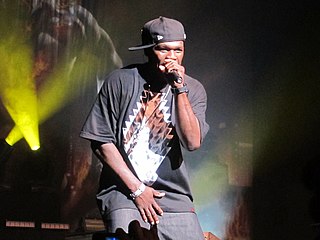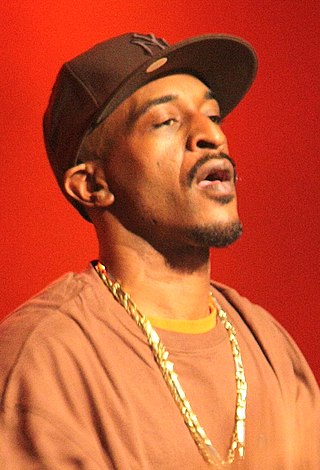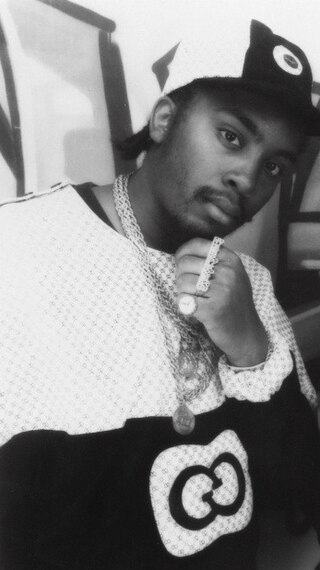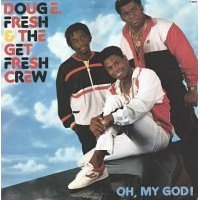
Rapping is an artistic form of vocal delivery and emotive expression that incorporates "rhyme, rhythmic speech, and [commonly] street vernacular". It is usually performed over a backing beat or musical accompaniment. The components of rap include "content", "flow", and "delivery". Rap differs from spoken-word poetry in that it is usually performed off-time to musical accompaniment. It also differs from singing, which varies in pitch and does not always include words. Because they do not rely on pitch inflection, some rap artists may play with timbre or other vocal qualities. Rap is a primary ingredient of hip-hop music, and so commonly associated with the genre that it is sometimes called "rap music".
Old-school hip hop is the earliest commercially recorded hip hop music and the original style of the genre. It typically refers to the music created around 1979 to 1983, as well as any hip hop that does not adhere to contemporary styles.
The new school of hip hop was a movement in hip hop music, beginning in 1983–84 with the early records of Run–D.M.C., Whodini, and LL Cool J. Predominantly from Queens and Brooklyn, it was characterized by Drum Machine-led minimalism, often tinged with elements of Rock; rapped taunts, boasts, and socio-political commentary; and aggressive, self-assertive delivery. In song and image, its artists projected a tough, cool, street B-boy attitude. These elements contrasted sharply with Funk and Disco, Novelty hits, live bands, synthesizers, and party rhymes of artists prevalent in the early 1980s. Compared to their older hip hop counterparts, new school artists crafted more cohesive LPs and shorter songs more amenable to airplay. By 1986, their releases began to establish hip hop in the mainstream.

Richard Martin Lloyd Walters, better known as Slick Rick, is an English-American rapper and record producer. He rose to prominence as part of Doug E. Fresh & the Get Fresh Crew in the mid-1980s. Their songs "The Show" and "La Di Da Di" are considered early hip hop classics. "La Di Da Di" is one of the most sampled songs in history.

Nathaniel Thomas Wilson, better known by his stage name Kool G Rap, is an American rapper. He began his career in the mid-1980s as one half of the group Kool G Rap & DJ Polo and as a member of the Juice Crew. He is widely considered to be one of the most influential and skilled MCs of all time, and a pioneer of mafioso rap/street/hardcore content and multisyllabic rhyming. On his album The Giancana Story, he stated that the "G" in his name stands for "Giancana", but on other occasions he has stated that it stands for "Genius".
Freestyle is a style of hip hop music where an artist normally improvises an unwritten verse from the head, with or without instrumental beats, in which lyrics are recited with no particular subject or structure. It can also be a written verse with no particular subject. It is similar to other improvisational music, such as jazz, where a lead instrumentalist acts as an improviser with a supporting band providing a beat. Freestyle originally was simply verse that is free of style, written rhymes that do not follow a specific subject matter, or predetermined cadence. The newer style with the improvisation grew popular starting in the early 1990s. It is now mainly associated with hip hop.

Beat Street is a 1984 American dance drama film featuring New York City hip hop culture of the early 1980s. Set in the South Bronx, the film follows the lives of a pair of brothers and their group of friends, all of whom are devoted to various elements of early hip hop culture, including breakdancing, DJing and graffiti.

William Michael Griffin Jr., better known by his stage name Rakim, is an American rapper. He is one half of golden age hip hop duo Eric B. & Rakim, with whom he released four albums: Paid in Full (1987), Follow the Leader (1988), Let the Rhythm Hit 'Em (1990), and Don't Sweat the Technique (1992). He also released four solo albums: The 18th Letter (1997), The Master (1999), The Seventh Seal (2009), and G.O.D.'s Network: Reb7rth (2024).
Mohandas Dewese, better known by his stage name Kool Moe Dee, is an American rapper, songwriter and actor. Considered one of the forerunners of the new jack swing sound in hip hop, he gained fame in the 1980s as a member of one of the pioneering groups in hip hop music, the Treacherous Three, and for his later solo career. During his career he released a total of seven studio albums, with 1994's Interlude being the last to date.

Antonio Hardy, better known by his stage name Big Daddy Kane, is an American rapper, producer and actor who began his career in 1986 as a member of the Juice Crew. He is widely regarded as one of the most influential and skilled MCs in hip hop. Rolling Stone ranked his song "Ain't No Half-Steppin'" number 25 on its list of The 50 Greatest Hip-Hop Songs of All Time, calling him "a master wordsmith of rap's late-golden age and a huge influence on a generation of MCs".

How Ya Like Me Now is the second solo studio album by American rapper Kool Moe Dee from the Treacherous Three. It was recorded at Battery Studios in London, England and released on November 3, 1987, via Jive Records.

Louis Eric Barrier is an American rapper, record producer, and DJ from New York City. One half of the golden age hip hop duo Eric B. & Rakim, he formed the group in 1986 and served as its primary producer and DJ. Their debut album, Paid in Full (1987) was named the greatest hip hop album of all time by MTV in 2006, and the duo were nominated in 2011 for induction into the Rock and Roll Hall of Fame.

"Hit 'Em Up" is a diss track by American rapper 2Pac, featuring the Outlawz. It is the B-side to the single "How Do U Want It", released on June 4, 1996. The song's lyrics contain vicious insults to several East Coast rappers, chiefly Shakur's former friend turned rival, the Notorious B.I.G.. The song was recorded at Can Am Studios on April 19, 1996. A previous version of the song was recorded on October 31, 1995.
The Treacherous Three was a pioneering American hip hop group that was formed in 1978 and consisted of DJ Easy Lee, Kool Moe Dee, L.A. Sunshine, Special K and Spoonie Gee, with occasional contributions from DJ Dano B, DJ Reggie Reg and DJ Crazy Eddie. They first appeared on record in 1980 on the B-side of Spoonie Gee's single, "Love Rap".

Lyte as a Rock is the debut studio album by American hip hop recording artist MC Lyte. It was released on April 19, 1988, via First Priority and Atlantic Records, and was produced by Audio Two, Prince Paul, and King of Chill and his group, Alliance.

Oh, My God! is the debut album by the rapper Doug E. Fresh. It was released in 1986 on Reality Records, a short-lived subsidiary of Fantasy Records. The album was produced by Dennis Bell and Ollie Cotton. The album was only a moderate success, peaking at #21 on the Top R&B Albums chart. To date, it has not been released on compact disc.
Battle rap is a type of rapping performed between two or more performers that incorporates boasts, insults, wordplay and disses originating in the African-American community. Battle rap is often performed spontaneously, or freestyled, in live battles known as rap battles, where participants will compete on the same stage to see who has the better verses.
"The Show" is a single by Doug E. Fresh & the Get Fresh Crew. Described as "a reality show of a Hip Hop performance" the track focuses on a conversation between Doug E. Fresh and MC Ricky D as they prepare for a show. The song incorporates portions of the melody from the theme song of the animated series Inspector Gadget. The original issue of the song featured a line where Slick Rick mockingly sings a verse from the Beatles' "Michelle" (1965), but all subsequent reissues have removed this line since the rights to the song were never secured.

Troy Donald Jamerson, better known by his stage name Pharoahe Monch, is an American rapper known for his complex lyrics, intricate delivery, and internal and multisyllabic rhyme schemes.
"Go See the Doctor" is a song by American rapper singer Kool Moe Dee. It was released in 1986 as the first single from his eponymous debut album. Originally published by Rooftop, it was later reissued by Jive.












